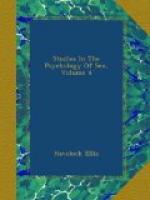As an interesting example of the importance attached by women novelists to the effects of the male voice I may refer to George Eliot’s Mill on the Floss, probably the most intimate and personal of George Eliot’s works. In Book VI of this novel the influence of Stephen Guest (a somewhat commonplace young man) over Maggie Tulliver is ascribed almost exclusively to the effect of his base voice in singing. We are definitely told of Maggie Tulliver’s “sensibility to the supreme excitement of music.” Thus, on one occasion, “all her intentions were lost in the vague state of emotion produced by the inspiring duet—emotion that seemed to make her at once strong and weak: strong for all enjoyment, weak for all resistance. Poor Maggie! She looked very beautiful when her soul was being played on in this way by the inexorable power of sound. You might have seen the slightest perceptible quivering through her whole frame as she leaned a little forward, clasping her hands as if to steady herself; while her eyes dilated and brightened into that wideopen, childish expression of wondering delight, which always came back in her happiest moments.” George Eliot’s novels contain many allusions to the powerful emotional effects of music.
It is unnecessary to refer to Tolstoy’s Kreutzer Sonata, in which music is regarded as the Galeotto to bring lovers together—“the connecting bond of music, the most refined lust of the senses.”
In primitive human courtship music very frequently plays a considerable part, though not usually the sole part, being generally found as the accompaniment of the song and the dance at erotic festivals.[125] The Gilas, of New Mexico, among whom courtship consists in a prolonged serenade day after day with the flute, furnish a somewhat exceptional case. Savage women are evidently very attentive to music; Backhouse (as quoted, by Ling Roth[126]) mentions how a woman belonging to the very primitive and now extinct Tasmanian race, when shown a musical box, listened “with intensity; her ears moved like those of a dog or horse, to catch the sound.”
I have found little evidence to show that music, except in occasional cases, exerts even the slightest specifically sexual effect on men, whether musical or unmusical. But I have ample evidence that it very frequently exerts to a slight but definite extent such an influence on women, even when quite normal. Judging from my own inquiries it would, indeed, seem likely that the majority of normal educated women are liable to experience some degree of definite sexual excitement from music; one states that orchestral music generally tends to produce this effect; another finds it chiefly from Wagner’s music; another from military music, etc. Others simply state—what, indeed, probably expresses the experience of most persons of either sex—that it heightens one’s mood. One lady mentions that some of her friends, whose erotic feelings are aroused by music, are especially affected in this way by the choral singing in Roman Catholic churches.[127]




